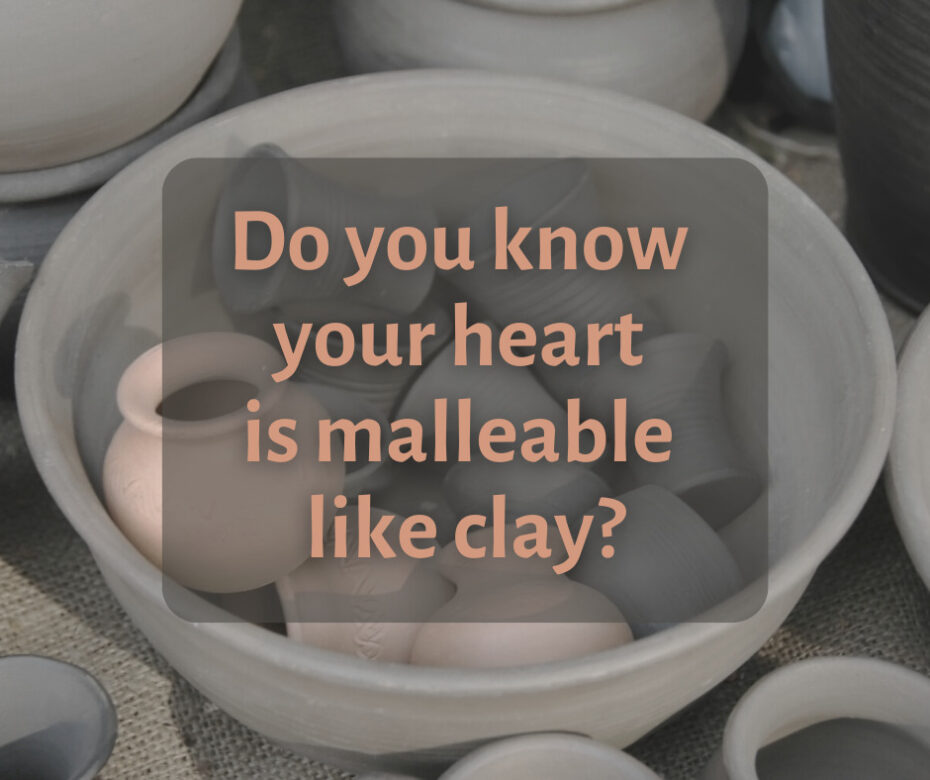Anybody who studies the book of Jeremiah will find himself frustrated about something in the book. It is hard to figure out when much of what the prophet said was spoken. Things are not written in chronological order. He prophesied during the reign of a number of kings, and the reader finds it difficult to determine in which passages which king was ruling.
Sometimes in the book, material is arranged by themes and not by when the action took place. One such example is found in chapters 18 and 19. The two chapters might not have happened together in time, but they have something in common. The common factor is clay.
In chapter 18, the prophet compares Judah to clay. God is the potter and He had molded Judah to be a nation to be blessed. But because of her sin of idolatry, He has redone the clay. Now, they are a nation that is about to be destroyed by the Babylonians.
The point of the illustration is that God can mold them in a way that they will be blessed or in a way that they will be cursed. The nation can repent, and God will remake the clay. They could change what was about to happen to them. Clay is malleable. (See this short video.) There is still hope for the nation.
In chapter 19, the prophet again talks about a potter. But this time, the clay in question has been hardened into a jar. Specifically, it is a jar that was made to carry water. Jeremiah is told to gather the leaders of Judah and lead them out of the city. There he pours the water out of the jar, indicating that all their plans are about to be poured out and come to nothing (19:7).
Then Jeremiah breaks the jar in front of these leaders. This indicates that the people of Judah, including the city of Jerusalem with the temple, will be destroyed. He points out that this means there is no reversal. A clay jar that has been hardened, once it has been broken, is useless.
It is easy to see the contrast between chapters 18 and 19. In chapter 18, the clay can be remolded. Things can change. But once it has been hardened into pottery, it cannot be remolded. A clay jar cannot be changed. When it is broken, it is good for nothing and must be discarded. In chapter 18, the people of Israel are like clay in the hands of the potter. They could still change their ways. Disaster could be averted. When Jeremiah speaks to the same people later, in chapter 19, that is not the case. It is too late. They have become hardened, like the clay in a jar, in their idolatry. God has determined that judgment would come to the nation.
Even though Jeremiah is talking to the nation of Judah, the same principle applies to us as individual believers. The author of Hebrews says that we can be hardened by sin as well (Heb 3:13). What he is talking about is the ability of sin to deceive us. God has promised to strengthen us when we go through problems and reward us if we handle them in a God-honoring way. When we are going through difficulties, we can convince ourselves that God will not be able to do what He has promised. We can become deceived and think it is better to seek the comfort of the world rather than rely on the promises of God.
Such an attitude is described as a process of hardening. Like clay that goes from the potter’s wheel and is made into a ceramic jar, our hearts can do the same thing. We can become hardened in our lack of faith in God’s goodness towards us and hardened in our love for the world.
In Jeremiah, the hardness the people as a nation had led to the destruction of their country at the hands of the Babylonians. In Hebrews, the hardness of heart can lead to the loss of marvelous eternal rewards for the individual believer.
There is another difference between Jeremiah and the author of Hebrews in this regard. Jeremiah’s use of the pottery jar was a message to the nation that it had gone too far. A believer, however, can always repent of his sins and come back into fellowship with the Lord.
But we as believers need to be extremely careful and take the warning in Jeremiah 18–19 to heart. Sin can deceive us. Sin can harden us. Over time, this process makes it more and more difficult for the Holy Spirit to get us to see how far away from fellowship with the Lord we have fallen. As soon as we see ourselves falling to the deceitfulness of sin, let us recognize it. When we do, we are more like the clay in the hands of the Potter than the hardened pottery of a ceramic jar.


